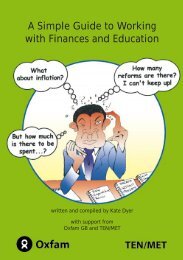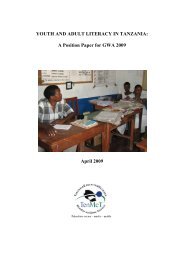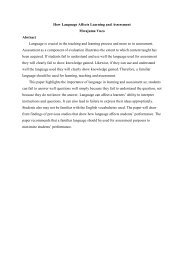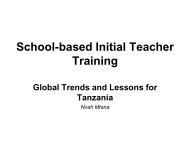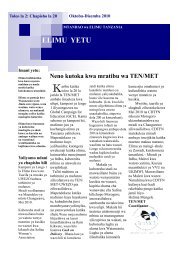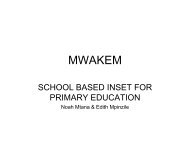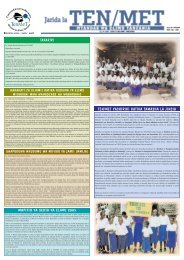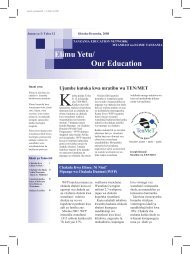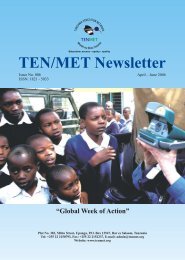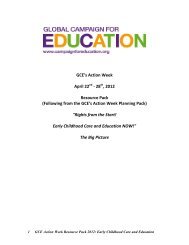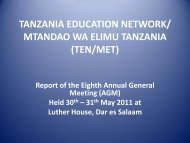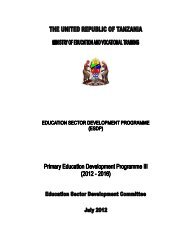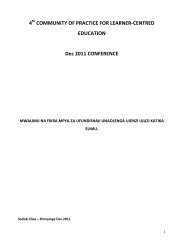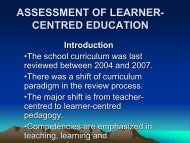this link. - Tanzania Education Network/Mtandao wa Elimu Tanzania ...
this link. - Tanzania Education Network/Mtandao wa Elimu Tanzania ...
this link. - Tanzania Education Network/Mtandao wa Elimu Tanzania ...
- No tags were found...
You also want an ePaper? Increase the reach of your titles
YUMPU automatically turns print PDFs into web optimized ePapers that Google loves.
CSO Contributions to the <strong>Education</strong> Sector Review 2012:The Quality of Teaching, Learning, and Application of Science, Mathematics, andEnglish in the <strong>Education</strong> SectorDar es Salaam, Sept 20121
Table of ContentsAcronyms ................................................................................................................................... 4Executive Summary ................................................................................................................... 5Introduction ................................................................................................................................ 6Intervention: “how” and “who” Issues ....................................................................................... 6Pre-primary/Early Childhood Development (ECD)............................................................... 6Teaching, learning and application of science, mathematics and English ............................. 7Achievements ......................................................................................................................... 7Challenges .............................................................................................................................. 7Lessons learned ...................................................................................................................... 8Primary <strong>Education</strong> ...................................................................................................................... 8Activities ................................................................................................................................ 9Achievements ....................................................................................................................... 10Construction work in Arusha, Kilimanjaro, and Manyara ................................................... 10Challenges ............................................................................................................................ 11The State of Learning and Application of Science, Mathematics, and English in PrimarySchools ..................................................................................................................................... 12Key findings ......................................................................................................................... 12Lessons Learned ................................................................................................................... 13Key Recommendations ........................................................................................................ 14Secondary <strong>Education</strong> ................................................................................................................ 15Activities included: .............................................................................................................. 16Research findings ................................................................................................................. 16Curriculum implementation ............................................................................................. 17Use of textual and non-textual materials in teaching ....................................................... 17Teaching and learning methods ........................................................................................ 172
Assessment methods ........................................................................................................ 17Professional development opportunities .......................................................................... 18Resource support in secondary schools ............................................................................ 19Achievements ................................................................................................................... 20Challenges ........................................................................................................................ 20Lessons learned ................................................................................................................ 21Recommendations ............................................................................................................ 22Teacher Training/Quality Teachers and training, an area in need of attention ........................ 22Introduction .......................................................................................................................... 22Teacher‟ resource centre (TRC)....................................................................................... 22Curriculum analysis .......................................................................................................... 22Some identified difficult topics and sub-topics ................................................................ 23Achievements ....................................................................................................................... 23Provision of TRCC teaching and learning materials ........................................................ 23Recommendations ................................................................................................................ 24Lessons learned .................................................................................................................... 25Advocacy and campaigning ................................................................................................. 25Learning and Recommendations. ..................................................................................... 26Other Contributions Performed By CSOs Indirectly Affecting the Teaching of Science,Mathematics, and English ........................................................................................................ 26CSOs which Contributed .......................................................................................................... 273
AcronymsAIDSBEDCCSOsDPsECDEFAETPGBSHIVMDGMKUKUTAMoEVTNERPEDPSEDPTEN/METTRCsUNICEFURTAcquired Immunodeficiency SyndromeBasic <strong>Education</strong> Development CommitteeCivil Society OrganizationsDevelopment PartnersEarly Childhood Development<strong>Education</strong> For All<strong>Education</strong> and Training PolicyGeneral Budget SupportHuman Immunodeficiency VirusMillennium Development GoalsMkakati <strong>wa</strong> Kukuza Uchumi na Kupunguza Umaskini <strong>Tanzania</strong>Ministry of <strong>Education</strong> and Vocational TrainingNet Enrolment RatePrimary <strong>Education</strong> Development PlanSecondary <strong>Education</strong> Development Plan<strong>Tanzania</strong> <strong>Education</strong> <strong>Network</strong>/<strong>Mtandao</strong> <strong>wa</strong> <strong>Elimu</strong> <strong>Tanzania</strong>Teacher Resource CentresUnited Nations International |Children‟s Emergency FundUnited Republic of <strong>Tanzania</strong>4
Executive SummaryWith the expanding space for civil society organizations (CSOs), Annual <strong>Education</strong> SectorReviews provide an opportunity for all key stakeholders to assess and contribute to thedevelopment of education. TEN/MET acknowledges that noticeable progress has been madein education in <strong>Tanzania</strong> and that much more remains to be done to meet <strong>Education</strong> for All(EFA) goals and the Millennium Development Goals (MDGs), let alone <strong>Tanzania</strong>Development Vision 2025 and MKUKUTA goals and targets. This core position paperprovides an account of CSO contributions to<strong>wa</strong>rds an improvement of detailed analysis ofcurrent critical issues in education and makes recommendations for action.As last year, <strong>this</strong> paper focuses on quality of teaching and learning and application on science,mathematics and English. We argue for a clear, well-articulated competence basedcurriculum, adequate teaching and learning resources, and conducive learning environmentsthat will support students develop capabilities values and skills needed.We also argue for equitable access to quality education made possible through inclusiveeducation in which regular schools and other educational institutions plan for, welcome,accommodate, and meet the learning needs of all students. Provision of appropriate andadequate equipment and materials for learners with special needs, including those arisingfrom disabilities, and mainstreaming cross-cutting issues in inclusive settings, will go a long<strong>wa</strong>y to address equity issues. It is the maximization of resources and minimization of barriersfor hitherto marginalized populations.While both PEDP and SEDP have dramatically increased enrolments, many children andyouth are still being excluded from accessing a full education of quality. Despite thequantitative achievement gained in terms of quality teaching and learning of science andmathematics practices are hardly improved. Equity is needed in both enrolments and otherqualitative aspects, including gender-sensitive, child-friendly experiences in the classroom,teaching/learning materials, and teachers taking responsibility for all learners in a school.We also argue that the status of the teacher and the teaching profession are in jeopardy if thethere are no deliberate efforts for teacher professional development in science, mathematics,and English, as well as, teacher remuneration and other incentives for quality educationimprovement.In order to foster the work of CSOs we would like to urge both the government anddevelopment partners to consider direct support to civil society in <strong>Tanzania</strong> to flourish and5
take on their rightful roles. These include complementing government efforts to improveeducational provision through “service provision where state provision is absent orinsufficient”, designing and implementing successful innovation.History will judge our collective leadership and actions based on the opportunity for thechildren of <strong>Tanzania</strong> to receive not any education, but an education that truly enables allchildren to develop the capabilities, values, and skills they need to thrive in the twenty-firstcentury global village. This justifies the importance of ensuring that teachers acquire thedesired right skills for teaching of mathematics, English, and science in the early years as afoundation for later education.IntroductionThe education sector review (ESR) process is the most significant annual pre-occupation foreducation stakeholders. The review is a great opportunity to influence education policy inboth the short and long term. It is also a learning experience for education civil societyorganizations (CSOs), Development Partners (DPs) and the government to ensure, explicitpartnership among the three levels of the school and community, districts or local authorities,and the State.During the year, CSOs have actively and constructively participated in education policyprocesses and advocated for quality education for all children, youths, in pursuing science,English, and mathematics in <strong>Tanzania</strong>. The amount of space that the government has so farascribed to civil society and the extent to which CSOs have taken advantage of it are atestimony of growing seriousness, by each side, in pursuing the development of educationagenda in <strong>Tanzania</strong>. It is also proof that CSOs have an important role to play in theimplementation of policies and programmes, especially in critiquing the effectiveness of theirimplementation. In addition, the reviews serve as reliable monitoring (and evaluative) toolsfor the <strong>Education</strong> Sector Development Programme, 2011-2017.Intervention: “how” and “who” IssuesPre-primary/Early Childhood Development (ECD)Pre primary is a formal school system for children aged five and six years. The two year cyclehas no examinations for promotion purposes. The total enrolment in pre-primary educationrose by 15.5 percent from 926,465 in year 2010 to 1,069,208 in year 2011. Despite theincrease, more efforts are required since according to the current <strong>Education</strong> and Training6
Policy (2012) pupils aged five years old should have pre-primary education for two yearsbefore they are admitted to standard 1.Despite the importance of <strong>this</strong> education level in laying the foundation for success in higherlevels, access and participation in pre-primary education are considerably low. The GrossEnrolment Rate is only 44.5. This means that fewer than half of pre-primary aged children arestill not enrolled.In year 2011 the NER percentage of official school age pupils enrolled in pre-primaryeducation is 42.5 percent although GER is 44.5 showing an increased trend in enrolment.Pupils with disabilities (intellectual, physical, hearing, and visual) are included in <strong>this</strong>number.Teaching, learning and application of science, mathematics and EnglishIn addressing the quality of teaching, learning and application of science, mathematics, andEnglish, not much has been done at pre-primary level. Very few CSOs have worked onimproving the teaching and learning of mathematics. The Village <strong>Education</strong> ProjectKilimanjaro (VEPK) have an activity of developing teaching materials using locally availableresources and training of teachers who teach mathematics at the pre-primary level in two<strong>wa</strong>rds of Marangu East and Mabogini in Moshi Rural District.AchievementsThe achievements from <strong>this</strong> project are:Better understanding of mathematics,Locally produced teaching materials,Trained teachers in child centred methodologies in mathematics.Teachers enjoying mathematics in the early years,Other teachers now <strong>wa</strong>nt to teach early-year pupils.Pre-primary books in mathematics translated into Kis<strong>wa</strong>hiliChallengesA lack of understanding of how children learn, especially in the early years (preprimary).A lack of understanding of the concept of „participatory teaching‟ and the use ofteaching materials7
Lack of good teaching books to guide and support the teachers in sound methods, andsubject-contentLimited resources (human and financial) to support mentoring of teachers and followupvisits.There are still very few pre-primary education programmes. Despite the provision inthe <strong>Education</strong> and Training Policy a majority of primary schools do not haveestablished pre-primary lower extension.Given the age of these young children (5-6 years), in rural areas primary schools arefar from most of the villages. The distances of four kilometres and above are too longwhile in many rural areas parents feel it is unsafe for such young children to <strong>wa</strong>lkthrough the bushes; thus enrolment has either been very low or not there.Although a number of CSOs and NGO provide service at pre-primary centres, most ofthe teachers have no experienceMKUKUTA stipulates that funds be disbursed to local communities via localgovernment to support ECD. Community based ECD programmes need to be <strong>link</strong>edto primary schools to improve delivery of education and learning.Lessons learnedThe task of attaining quality teaching and quality learning is huge.There is a serious shortage of qualified teachers for pre-primary education.A developmentally appropriate pre-school model that provides children with skills forschool and life success to make it worth the local government investment should beadopted.Through inclusive education where children with and without disabilities studytogether, it is found that there is an improvement in education whereby children caninteract themselves and have confidence in communication through sign language foracademic improvementThrough inclusive education where children with and without disabilities studytogether, it is found that there is an improvement in education whereby children caninteract themselves and have confidence in communication through sign language foracademic improvementPrimary <strong>Education</strong>Primary education is a seven year education cycle after pre-primary. It is universal andcompulsory for all children from age 7 to 13 years. As such the basic educational goals need8
ensuring that by 2015 all children, particularly girls, children in difficult circumstances andthose belonging to ethnic minorities, have access to and complete free and compulsoryprimary education of good quality.In addressing the quality of teaching, learning and application of science, mathematics andEnglish, not much has been done at primary level by CSOs. A few CSOs have worked inimproving the teaching and learning of mathematics, English, and application of science atprimary level.Reasons for choosing the three mentioned subjects <strong>wa</strong>s due to the poor performance observedin the National Primary School Leaving Certificate (PSLE) from the recent research resultscarried out between 1999 and 2010 by CSOs in different parts of the country. It <strong>wa</strong>s observedthat only a few boys and girls managed to score high grades of A, B, and C in the PrimaryLeaving National Examinations.Poor achievement in these subjects can be traced back to a lack of good backgroundknowledge in the early years at pre and lower primary level. A good number of CSOs haveintervention programmes/projects with primary education.ActivitiesIn improving the teaching and learning of mathematics seminars, workshops andmonitoring visits have been done.Development of teaching and learning materials for mathematics e.g. bottle tops,straws, and „simple computer.Development of teaching aids for EnglishInterventions aimed at improving learner centred teaching and learning methods andschool environment in target schools. Mathematics, English, and science subjectswere selected as subjects for training teachers theoretically and practically.Improving school environment by construction of more classrooms, rehabilitation ofold classrooms, toilets, and teacher‟s houses.Supplying of mathematics, English and science books for class 3 to 7, cabinets, andshelves for teachers.Kamamma organization has been implementing the education project at primary and preprimaryschool level known us „Community Based <strong>Education</strong> Improvement Initiatives in fivePrimary Schools of Arusha and Meru District Councils‟. Kamamma constructed 5 classroomsfor primary schools and 2 classrooms for pre-primary,5 teachers‟ houses, 8 latrines and9
provided 120 desks, lobbying and advocacy for education improvement at various levels(district to national level) and training of school management committees and planting trees atschools environment.AchievementsThrough use of real items as well as many fun activities and songs in mathematics thepupils now understand and enjoy mathematics better than before.Pupils‟ enrolment and attendance has increased in primary schools where CSOs haveintervened.School libraries have been established.Improved performance in schools.Visible and improved performance of girls in mathematics, English and sciencesubjects.Construction work in Arusha, Kilimanjaro, and ManyaraOne unit of teacher‟s house in Umoja primary school is completed.Construction in progress, one unit of pre-primary classroom at Karangai primaryschoolConducted Local Resource mobilization activities in the five communities ofMajimoto, Nganana, Umoja, &MaweniOne unit of teacher‟s house in Nganana primary school is still under constructionTo train about 55 School Management Committee membersMeet with SMC in the 5 primary schools of Maweni, Nganana, Karangai, Majimoto,and Umoja.10
Supervision of the ongoing construction activities in the above mentioned schools.Monitoring and Evaluation done for Community Based <strong>Education</strong> in five primaryschools (Umoja, Karangai, Maweni, Majimoto, and Nganana)ChallengesThe shortcomings in teaching these subjects, in our experience are:Frequent changes of curriculum without accompanying textbooksInadequate trained teachers in early childhood educationShortage of teachers to the rural primary schoolsA lack of understanding of the concept of participatory teaching and the use ofteaching materialsPoor preparation of pupils and teachers at pre primary levelInsufficiency of books and teaching aids in English, mathematics, and sciencesubjects.Teachers low capacity in English language for example, teaching English throughKis<strong>wa</strong>hiliAdvocating for resumption of the 3R in class 1and 2 as of old practiceToo many subjects (7) at class one all being taught by one teacherLack of counsellors for children to cope with physical and emotional body changes asthey grow, which affects concentration.Poor teachers, working environment at rural schools are demoralized11
Demoralized teachers due to lack of motivation.The manner in which inspectors approach teachers in schools is not in a friendlymanner for career and professional developmentInadequate teaching and learning materials.The State of Learning and Application of Science, Mathematics, and English in PrimarySchoolsIn May 2011, Uwezo <strong>Tanzania</strong> conducted the 2 nd Annual Learning Assessment, results of anassessment that covered 132 districts, 3,849 villages, 76,796 households, and 128,005children who were assessed in Kis<strong>wa</strong>hili, English, and Numeracy. Our assessments wereaimed at the Standard 2 level in each subject, meaning that all pupils in Standard 3 and aboveshould have been able to pass them. This research‟s English and numeracy findings have beenshared across various key education stakeholders through meeting, debates and conferencesand even one to one discussion. For the purpose of <strong>this</strong> paper CSOs focus is on English andnumeracy (mathematics) only. Here are the key findings and recommendations based on thetwo subjects.Key findingsAcross <strong>Tanzania</strong>, only 4 of 10 students in Standard 7 can complete successfully theStandard 2 assessments in English and mathematicsOnly 1 in 10 Standard 3 pupils can read a Standard 2 English story.12
Only 3 in 10 Standard 3 pupils can add, subtract and multiply.Pupils with pre-primary education have an advantage in performing better than othersOver 6 of 10 Standard 7 pupils whose parents both attended secondary school areproficient at least the Standard 2 level in the two subject, compared with just 3 in 10of students whose parents did not attend any school.Urban secondary school pupils tend to perform better than rural pupils. About 4 in 10secondary school pupils are from urban areas, compared with fewer than 3 in 10primary school pupils.There are very large regional differences in access to school facilities. For example,more than 80% of schools in the Kilimanjaro region provide lunch or tea to its pupils,compared to less than 10% of schools in Kigoma and Mbeya.Some regions consistently out-perform other regions on access to school facilities. Forinstance, schools in Kilimanjaro and Arusha tend to have better facilities (as well ashigher teacher attendance rates; while schools in Tabora, Mara and M<strong>wa</strong>nza generallyshow much more challenging conditions. This raises concerns regarding thedistribution of resources between and within regions.Some teachers are often absent from schools. About 20% of teachers are often notpresent in school, <strong>this</strong> makes it difficult for children to learn consistentlyConclusively, across <strong>Tanzania</strong>, children are struggling to get the better education theydeserve in English and mathematics. The picture looks different in different areas.Some districts fare better than the national average, others fare worse. Such acomparison may be of interest to local education experts, teachers, head teachers, anddistrict education officers.Lessons LearnedLong service teachers need regular in-service training in facilitating participatory andactive learning methods.The task to attain quality teaching and quality learning is huge. The task, with thecurrent school environments and personnel, can be helped initially by producingquality materials which support the teachers with activities and exercises throughwhich the pupils can show whether they understand the topic or not. Once the teachersknow that learning is taking place then they can be encouraged. This will preventgetting through the syllabus without consideration of the pupils‟ learning.13
Quality materials will help the teachers to understand the topics before they go toteach them.Assessment of pupils‟ understanding is poor, and assessment methods need to changeto reflect participatory teaching.When teachers are given the right support and guidance they can perform well andreal learning can take place.Parents are willing to participate and contribute resources to the development of theirrespective school if not politician being interferedIf infrastructures of a certain schools are improved then teachers as well as pupilsperformances will be improved.<strong>Education</strong> sector need a jointly stakeholders efforts to address challenges facing therural primary schools in particular.We also learned that education in a certain area improves if economic status of therespective community is improved; <strong>this</strong> will definitely contribute to educationenhancement in the area.If the children are guaranteed the support of their basic needs they can do wonders intheir performances.The communities are not ready to support children in need like they do in other socialactivities.The policies of safeguarding the children are not implemented accordingly by theresponsible authorities.Key RecommendationsCSOs are demonstrating powerfully that schooling is not translating into learning. Billions ofdollars are <strong>wa</strong>sted each year. An even greater level of aspirations of parents and students arejeopardized. We recommend that:We need to shed our obsession with counting schooling inputs and instead focussquarely on learning outcomes, on what children are learning. The question now is not“How many classrooms have we built?” but “Can Anna read?” Teaching must focuson an individual learner.While lots of things are important, we need to prioritize on the most important factorsthat make a big difference in quality learning, such as motivating teachers and holdingthem accountable, and creating an environment for children that is engaging andinteractive.14
The MOEVT and PMORALG should improve provision of the teaching and learningmaterials and classroom equipment (text books and other teaching materials, desks)The MOEVT and PMORALG should allocate enough resources for Schoolsinspection and monitoring & Evaluation as a yardstick for ensuring quality education.Ensure each school have a library and a language and science laboratory for primaryand especially for secondary schools.It the right time primary school teachers to have foreign language kills.Ensure each school have a library and a language and science laboratory for primaryand especially for secondary schools.There should be a purposive intention of ensuring required class pupil ratio.Development of curricula should involve various education stakeholders and avoidfrequent changes.Improve teachers‟ packages including ideal living houses.Secondary <strong>Education</strong>The secondary education reform through SEDP aims at enrolment expansion, equityimprovement, quality improvement, student performance improvement, management reforms,and system management efficiency. An ideal secondary NER would be total enrolment ofprimary education pupils in secondary schools providing education of good quality.In addressing the quality of teaching, learning and application of science, mathematics, andEnglish, not much has been done at secondary school level by CSOs. A few CSOs haveworked in improving the teaching and learning of English at secondary level.One of the initiatives in English <strong>wa</strong>s a Development Programme for Secondary SchoolEnglish Teachers that ran from October 2011 until April 2012.The Programme aimed toimprove the quality of education experienced by secondary school students in 14 schools andthree teacher training colleges in <strong>Tanzania</strong> mainland and Zanzibar. This case study focuses onKiteto District Council and three pilot secondary schools. (November 2011 – March 2012)The beneficiaries for <strong>this</strong> case study include34 teachers3 Head Teachers.4 Champion Teachers15
Activities included:12 Days of accredited English Language Upgrading Training by the BritishCouncil for the Champion Teachers.Continuous mentoring support to the Champion Teachers60 hours of English Language Training delivered to 32 teachers.Another initiative <strong>wa</strong>s establishment of science clubs in two secondary schools in Ilomba andIvumwe Communities in Mbeya region that enhanced access to science laboratory use.Library books of chemistry, physics, biology and mathematics were provided to communitysecondary schools in Mbeya, Ruk<strong>wa</strong>, Dodoma, Kigoma, Kagera, and Iringa regions.Research findingsFor the past five years, and particularly the years 2010 and 2011, students‟ performance in theForm Four National Examinations has steadily declined, with the majority of candidatesscoring between Divisions IV and zero. For example, of the 354, 042 candidates who sat forthe 2010 National Form Four Examinations, 177,021 (50%) candidates scored Division 0 and136, 633 (38.6%) scored Division IV. Thus 88.6 percent of the candidates scored division IVand 0. Only 15,335 (4.3%) candidates scored Divisions I and II (Hakielimu, 2012).Therefore,86.6 percent of the candidates failed the 2010 National Examinations as they cannot proceedwith any further levels of education.Many reasons have been given to explain the poor 2010 and 2011 Form Four NationalExamination results. Some are:Lack of teachers and poor teaching and learning environment.Curriculum implementationTeaching and learning methods employed by the teachers16
Assessment methods usedLack of professional development opportunitiesCurriculum implementationSince 2005, the Government of the United Republic of <strong>Tanzania</strong> has been implementing acompetence based curriculum, which emphasises the development of certain specified keycompetences. A set of standards of resources (textual and non-textual) have been identifiedfor effective implementation of competence based curriculum. These, include a number ofteaching and learning resources such as textbooks, syllabi, modules and manuals, referencebooks, charts and maps, newspapers, journals, and encyclopaedias, texts in Braille, posters,fliers and photographs, and booklets and brochures.Use of textual and non-textual materials in teachingThe most frequently used items in teaching were books and syllabi. Fewer than 40 percent ofthe teachers used other items in teaching. This is clearly, therefore, one area that isproblematic in the implementation of competence based curriculum. The poor or low use oftextual materials in teaching could partly be explained by scarcity of such materials inschools. Where only 17 percent of the responding teachers reported having al<strong>wa</strong>ys/often usedICT resources in teaching, <strong>this</strong> indicates lack of ICT facilities in schools. Use of scientific andcreative teaching facilities such as samples of actual materials, prototypes and laboratoryapparatus <strong>wa</strong>s generally low.Teaching and learning methodsCompetence based curriculum emphasizes a learner centred approach with a focus onmultiple teaching and learning methods. The teaching approach is to encourage learners to beactively involved and take responsibility of their own learning through participatory andinteraction teaching and learning methods in the classroom. Teachers reported using acombination of participatory methods in teaching. The most frequently used methods weregroup works and presentations, problem solving and enquiry and debates and groupdiscussions. However, 35 percent of the responding teachers reported al<strong>wa</strong>ys/often usinglecturing.Assessment methodsAssessment in competence based curriculum is part and parcel of the curriculumimplementation process and is supposed to be competence based as well. Several assessmentmethods are envisaged to be used in competence based curriculum. These include the use of17
portfolios, use of rating scales, use of checklists, oral presentations, project work, practicaltasks to demonstrate performance skills, written essays or reports, analysis of texts and inclasstests and end of terms written examination.Respondents were presented with a set of possible assessment methods and were asked toindicate the extent to which they used such methods in assessing their students‟ performance.The most frequently used methods of assessment were in-class tests and end of terms writtenexaminations, written essays or reports, analysis of texts, and practical tasks. Project workand use of portfolios, though envisaged in competence based curriculum as importantassessment methods, were among the least-used assessment methods by teachers.Professional development opportunitiesContinuous professional development opportunities for teachers is an important factor ineffective implementation of competence based curriculum and teachers‟ professionaldevelopment in general. In <strong>this</strong> regard, teachers were asked to indicate whether they had everattended professional development training programme in the past five years.On average, just about a third (33.5%) of the teachers reported having attended professionaldevelopment training opportunity in the past five years. Though the competence basedcurriculum <strong>wa</strong>s introduced <strong>wa</strong>y back in 2005, just about a third of the teachers reportedreceiving any training in <strong>this</strong> area (See table below). Clearly, therefore, the implementation of<strong>this</strong> curriculum approach is problematic.18
Have you ever attended a training programme on:% Yes1. Developing the content knowledge in your subject 39.2%2. Focusing on understanding students' thinking and behaviours 30.2%3. Focusing on teaching strategies 42.1%4. Focusing on the use of competence based education 37.3%5. Focusing on how to assess students in competence basededucation6. Observing other teachers teaching your subject and discusswith them their teaching strategies7. Meeting regularly with a group of teachers in your local areato discuss teaching issues in your subject35.7%40.4%37.2%8. Attending national conference meeting in your subject 5.9%Resource support in secondary schoolsUnder the expanding educational initiatives of Unity in Diversity Foundation (UDF), theorganization has directly assisted a number of regional secondary schools with resources andprogram support.UDF provided a <strong>link</strong> between the Ilomba Community School and theIvumwe Parents School so students from Ilomba, who previously did not have access to aproper science laboratory, could use the science lab resources of the Ivumwe School.UDF is cooperating with <strong>Tanzania</strong> Library Board Service. We have <strong>this</strong> program to supplyLibrary books to Community Secondary schools in <strong>Tanzania</strong>. A few community and privateschools have received Library books, These include Ilomba Community Secondary School100, Ihalimba Community Secondary School 450, Vanessa Secondary School 115, KalobeCommunity Secondary School 115, and Jifunzeni Community Secondary School 200,U<strong>wa</strong>taa secondary school 115, Vanessa secondary school 115, and Stela Farm Secondaryschool 200.19
AchievementsChallengesEnglish Language skills and English Language Teaching skills.Higher number of students excelled in science subjects.34 Teachers English language skills and confidence to speak and teach in Englishhave increased.4 Champion Teachers have improved their English skills, English Language teachingskills and delivered-60 hours of training.32 teachers developed low cost teaching aids and have used these to improve theirteaching.5 education leaders developed a draft of quality assessment frameworkWhole school meetings were held and SMART targets to improve quality were agreedand are progressing.An ambitious project <strong>wa</strong>s delivered in a short time span with a high degree ofcommitment and engagement from project participantsIncreased access to school library to Community Secondary Schools programme.Establishment of science clubs at the Community (E.g. Ilomba and Ivumwe ParentsSecondary SchoolsEstablishment of science clubs: As a result of the science club and the expandedaccess to science laboratories, a higher number of students excelled in science classand will have the opportunity to advance to advanced science courses.Improved gender relations within schoolsImproved academic performance and achievement for girls and boys through theTUSEMELimited resources at school level: While project resources contributed to the schools‟capacity to enable students‟ learning, the schools struggle to access appropriateteaching and learning resources to support the transition from „chalk and talk‟ to alearner centred pedagogy.Opportunities for teachers to become „Champion‟ teachers are not embedded inexisting career paths.There is no adequate provision at district level to train and coach school leaders.Many secondary schools do not have equipped laboratories. Some schools studyscience through study visits to other schools, only a few hours per term.20
Inadequate reference books in secondary schools. Parents cannot afford to purchasethem because they are very expensive.Students join secondary schools with insufficient ability in English.Science and mathematics subjects require motivated and committed teachers.Inadequate qualified teachers in English, mathematics, and science subjects.Absence of English debates or exchange visits between schools that in the pastimproved mastery of the subject.Despite notable achievements, there are still challenges that if not eliminated,achieving gender equity and equality, will be problemVery little has been documentedReplication of best practices takes so long and it is very slow.Lessons learnedIn-service training of teachers is obligatory in order to cope with new innovations andadvancement in technology.Gender insensitive learning and teaching methodologies still do not take into account specificneeds of girls and boys. In schools for instance, most of teachers are not gender sensitive inthe learning and teaching processes because of the internalized gender discriminatory culturalbeliefs and practices. In most cases teachers use gender insensitive methods that do not takeinto account the specific learning needs of both girls and boys, and gender stereotypedteaching materials that entrench gender disparity of which girls suffer most. These in turn,affect the pupils‟ transition to the secondary level where by the number of those who pass theNational Exam especially girls, decreases.MoEVT is taking so long to upscale these interventions to other schools. If the MOEVT is notadvised to speed up the mainstreaming of TUSEME in all schools in <strong>Tanzania</strong> (because it is agood intervention for building girls‟ confidence to speak out when they are violated), the onlyfew districts will not bring the impact to the country on gender equity and equality in theeducation sector.If in-service and pre-service teachers are not trained on gender responsive pedagogy attainingsustainable quality education will be a dream.In <strong>this</strong> regard Gender Based Violence must be included in the school curriculum and studentsbe sensitized on GBV issues. In order to reach greater impact; and for sustainability purposes,21
Gender Responsive Pedagogy – GRP, should be integrated into Teacher Training Colleges(Teaching Curriculum)RecommendationsOn the basis of the results of <strong>this</strong> study, the following recommendations are made for policyaction and further research.There should be close collaboration and consultation between NECTA and TIE so asto have a common understanding of competence based curriculum regarding itsconception, philosophy, and in particular, how its objectives and intended learningoutcomes should be assessed.English seems to be a problem for pupils in Secondary School so the Government hasto prepare a curriculum for science subjects and start to be taught in English atPrimary Level.Teacher Training/Quality Teachers and training, an area in need of attentionIntroductionTeacher education has not squarely addressed the supply of teachers for pre-primaryeducation and facilitators for adult and non-formal education (A/NFE), despite the expandingrole of the Institute of Adult <strong>Education</strong> to train tutors and facilitators for A/NFE. Currentlythe status of teachers and the teaching profession is low as reflected in low <strong>wa</strong>ges, poorworking conditions, and a lack of political will to address <strong>this</strong> critical component of qualityeducationTeacher’ resource centre (TRC)Teachers Resource Centres are central for improving quality teaching of science,mathematics, and English. Teachers Resource Centres Coalition (TRCC) is working to<strong>wa</strong>rdsimproving professional and academic skills of teachers through Teachers Resource Centres(TRCs). There are 600 Teachers Resource Centres in <strong>Tanzania</strong> (Mainland and Zanzibar). Thecoalition ensures TRCs and the Community is participating in enhancing the delivery ofquality education through using TRSs.Curriculum analysisDespite the mathematics, science, and English syllabi being in place, the majority of theprimary school teachers have continued to face difficulties in teaching some topics and subtopicsin science, mathematics and English. Some of the contributing factors are:A lack of teaching materials and poor teaching and learning environment,22
Overcrowded classrooms, up to 100 in some classes due to the shortage of teachersand or classrooms hinders practical in science classes.lack of essential science equipment, such as science kits, and high pupil book ratiosLack of teacher‟s innovations of preparation of teaching materials for science subjects.Some identified difficult topics and sub-topicsIn science subjects the following topics were identified as difficult ones that needed teachers‟in service training: For instance in standard 3 and 4: Mbinu na Taratibu za Kisayansi; Nishati,mashine na kazi k<strong>wa</strong> m<strong>wa</strong>nafunzi <strong>wa</strong> darasa III & IV, Mbinu na Taratibu za kisayansi,matumizi ya Kivunge cha sayansi. For standard 5, 6 and 7: Mbinu na Taratibu za Kisayansi,Dunia na Anga, Nishati, Mashine na Kazi and Mabadiliko katika mazingira.In mathematics, some of the topics identified as difficult by the teachers are: in standard 3and 4: namba nzima; matendo katika namba; jometri, sehemu za namba nzima na vipimmoDesimali darasa VI na VII: Namba kamili darasa VI na VII; Kufumbua milinganyo darasa VIna VII: Jometri darasa VI na VIIIn English: expressing politeness; expressing on-going activities; expressing means oftravelling; expressing directionIn order to tackle the knowledge gap we worked with four teacher colleges (Morogoro,Butimba, Korogwe, and Patandi) to develop training modules based on the identified difficulttopics and sub topics. A total of three modules for science (standard 1-2; 3-4; 5-7 levels); alsofour for mathematics following same format levels and four for English (1-2; 3-4 and 5, 6-7levels) and 4 for mathematics (1-2; 3-4, 5, 6-7 levels) were developed, printed and distributedto schools. A total of 11 modules and 18,500 copies of these modules were printed anddistributed to schools. These modules were used in teacher training in the project area inShinyanga District.AchievementsProvision of TRCC teaching and learning materialsTraining activities have enabled teachers to adopt and adapt the LCA approach in their day today teaching activities. Teachers are better equipped with new teaching methodologies, andhave acquired specific teaching skills, management skills for teaching science andmathematics subjects and developed a teamwork spirit.23
<strong>Education</strong> officers at district level, head teachers and classroom teachers are able to associatethe science subjects with increased teacher competence and enhanced teaching and learning.Parents of children in the project area were a useful source of information regarding therelevance and quality of education offered through the EQUIP project.Mentors have been supporting their fellow teachers in improving their pedagogical contentknowledge that enabled the mentees to deal more confidently with students of varyingaptitudes.Improved relationship between teachers and pupils and greater a<strong>wa</strong>reness about varyingneeds of pupils in science and mathematics.RecommendationsThe majority of teachers are not conversant with the concepts and requirements of acompetence based curriculum, which is being implemented in schools. There is therefore aneed, as a matter of urgency, to devise a mechanism through which teachers could be givenproper orientation on the concept, philosophy, and requirements of a competence basedcurriculumFor teachers to be competent, conversant, and committed in their profession, they need,among other things, continuous professional development opportunities, which should beprovided on a regular basis. The MoEVT and other relevant stakeholders should devisesustainable mechanisms for providing professional development opportunities for teachers,regularly, and sustainably.Frequent changes of the curriculum without adequate preparation in terms of the teaching andlearning materials also negatively affect students‟ performance as well as teaching andlearning processes. Frequent changes in the type of books, which students are supposed toread as well as frequent changes in examination formats also affect students. TIE and NECTAshould provide enough time and training to implementers whenever changes are made incurricula and examinations formats before students sit for examinations under the newcurriculum to enable them internalize the changes.Government should honour its obligation to provide quality education as a basic right throughproviding adequate funding and timely disbursement of funds;The MOEVT to have deliberate measures to ensure science teachers are retained in schools24
Professional development for primary school teachers should be a process to enable teachersto share practical experiences and for individual teachers development.The MOEVT and PMORALG should establish TRCs in each <strong>wa</strong>rd and equip them.Collaboration among education stakeholders should be strengthened in pursuance of qualityeducation.On our part as CSOs, more advocacy work needs to be directed to<strong>wa</strong>rds ensuring thatadequate resources reach the schools.Lessons learnedIncreased visibility and usage of the TRCs, will empower schools and improve the quality ofscience, mathematics, and English.The increased a<strong>wa</strong>reness on the use of TRCs has resulted in improving the capacity ofteachers and the school Committees in taking up their roles and responsibilities includingWhole School Development.Build a reading culture is a long-term process; impact is slow in coming.Advocacy and campaigningTEN/MET carries out strong and visible advocacy actions involving wider public on learnercentredapproach. Major successes have been achieved in advocacy of the learner-centredapproach. There is heightened a<strong>wa</strong>reness and acceptance of the LCA by stakeholders at alllevels. The approach is seen as a model by other stakeholders including the Ministry of<strong>Education</strong> and Vocational Training (MoEVT), the <strong>Tanzania</strong> Institute of <strong>Education</strong> (TIE), andthe Inspectorate department who have officially adopted competence based curricula.The Arusha <strong>Network</strong> advocated and campaigned for improvement of the teaching andlearning environment focusing on availability of mathematics books for standard 6 and 7 inschools in Arusha, Kilimanjaro and Manyara regions by mobilizing community members.One book, one pupil to improve quality of education campaign25
Learning and RecommendationsReview policy documents and plans so as to integrate Gender Responsive Pedagogy inGovernment plans and interventions.Continue to mobilize the rural communities to participate and contribute resources toeducation improvement in the area.Advocate for ECD program improvement in the districtMobilize the communities to participate in supporting children.Establishment of the ECD centresOther Contributions Performed By CSOs Indirectly Affecting the Teaching of Science,Mathematics, and EnglishSensitize and empower community to support education developmentSeminars targeting civil servants done in planning and budgeting of the educationsector to understand the role of TRCs, School committees, WSDP, PETS and others.The following <strong>wa</strong>s observed.o Policy advocacyo Community advocacyo Demonstrative interventionso Empowering teachers and girls in school26
CSOs which ContributedNAME ADDRESS TELEPHONEAdilisha Child Box 11098, M<strong>wa</strong>nza +255755470090AGAPE AIDS Control Programme Box 2189, Shinyanga +255757516965Arusha <strong>Education</strong> <strong>Network</strong> Box 15102, Arusha +255272500298BESEDEA Box 45, Biharamulo +255282225139Bagamoyo <strong>Education</strong> and Development Box 159, DSM +255)754264268Foundation (BEDF)Child in Crisis Africa (CICA) Box 33588, DSM +255754 -589328Children‟s Book Project Box 33588, DSM +2552112918/2123730Community Counselling Team(COCOTE) Box 11105, Arusha +255754684937Comprehensive Support to Persons with Disabilities (COSUPED)Box 71434, DSM +255754578593Christian Youth Spiritual Ministry (CYSM) Box 193, Mbulu +255272533352Environmental, Health and Entrepreneurship (EHE)Box 31406, DSM +255716688096FAWE <strong>Tanzania</strong> Box 63119, DSM +255222122871Leadership Forum Box 79450, DSM +255222134048Hakielimu Box 739, DSM +255222151852Kamamma Integrated Development Trust Fund Box 2371, Arusha +255272508518Maarifa ni Ufunguo Box 15102, Arusha +255272549298Oxfam GB Box 10962, DSM +255222772718Plan International in <strong>Tanzania</strong> Box 3571, DSM +255222601576Safina Women‟s Association +255713514989SOS Children Village <strong>Tanzania</strong> Box 80462, DSM +255222760794Taaluma Women Group (TWG) Box 75720, DSM +25571355337727
Teacher‟s Resource Centre Coalition (TRCC)Box 79865, DSM +255713460610TUSHIRIKI Box 3330 +255713495557Unity in Diversity Foundation (UDF) Box 6404, Mbeya +255784212573Uwezo <strong>Tanzania</strong>Box 38342, DSMVillage ED Project Box 737, Marangu +255754312086VSO <strong>Tanzania</strong> and British Council Box 6297, DSM +25522260005328



